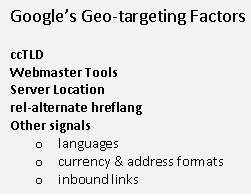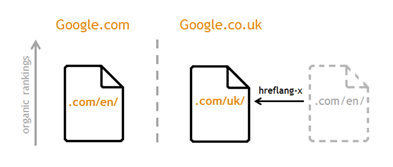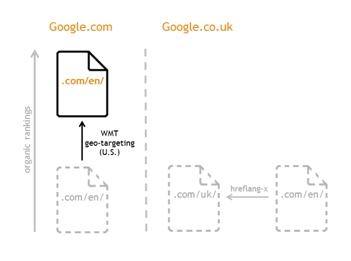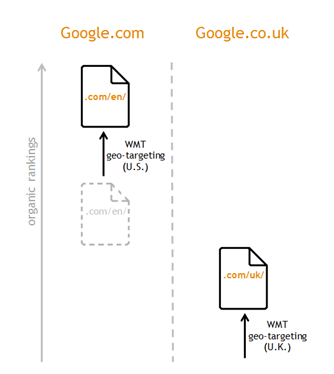It’s been a while since I read some fresh content about rel-alternate hreflang-x. It seems there’s less talk about it nowadays and more site owners or webmasters just get on implementing it. Does it work so well that you see more implementations of it? Well, not exactly.
I have seen a number of sites just go out and implement hreflang-x without any reasoning behind it except for this: it’s a geo-targeting factor so we need it to make our geo-targeting better! Indeed, it can be a signal but should you be giving it to Google?
 You’ve probably seen this list of geo-targeting factors ranked by importance as presented to the right at some point. The more of these signals you send to Google and the more consistent they are, the better your geo-targeting will be. For instance, if you additionally use local hosting and have a localised backlink profile, your site might rank better in that country. If you use a ccTLD your geo-targeting will get a lot better.
You’ve probably seen this list of geo-targeting factors ranked by importance as presented to the right at some point. The more of these signals you send to Google and the more consistent they are, the better your geo-targeting will be. For instance, if you additionally use local hosting and have a localised backlink profile, your site might rank better in that country. If you use a ccTLD your geo-targeting will get a lot better.
Each item on this list is a factor but its importance varies depending on your scenario. If you use ccTLDs then hosting your sites locally may not result in any noticeable improvement. If you use a generic domain setup then local backlinks are likely to have more impact on your geo-targeting than if you were to use ccTLDs. And so on. But hreflang-x is the only item featured on this list that will have impact in a very limited amount of scenarios. In fact, it’s not really a factor to begin with. It’s a problem-fixing tool to be applied when there’s a problem. So, in my opinion it shouldn’t be on the list of geo-targeting factors but – perhaps – geo-targeting tools. Let’s take a step back for a moment and remind ourselves what hreflang-x really does.
Sitemap geo-targeting and optimisation advice (hreflang)

If your website is available in different languages it is essential that the correct version displays in each geo-target. Our geo-targeting strategy team will review your sitemap and website performance in each of your target countries, providing recommendations on how you can make changes, such as adding Hreflang tags, to improve your geo-targeting performance. These recommendations will be delivered to you in an Excel or PowerPoint format, and a member of our team will also explain the recommendations made.
Sponsored
URL Swapping
Let’s imagine for a moment that we have a US version of a website with its pages in the subfolder example.com/en/ and an equivalent UK website with pages in the subfolder example.com/uk/. The US site ranks well in Google.com organic search from which visitors arrive to the site.
But this US site also appears in Google.co.uk rather than its UK equivalent, mainly due to more backlinks that the US site has. There’s also no effective geo-targeting in place. We decide to deploy hreflang-x. In effect the /uk/ site now ranks in Google.co.uk being swapped with US. Did we affect geo-targeting? No. All we managed to do is steal the US site’s rankings and have the UK site take its place.
Now, let’s set the geographic target setting to “United States” in Google Webmaster Tools for example.com/en/. Rankings of the US site improve in Google.com (we’ve affected the site’s geo-targeting) but at the same time rankings in Google.co.uk drop almost completely because the site is strictly targeting United States now. The UK site also lost its rankings in Google.co.uk. Why? Technically, they weren’t the site’s rankings but those “borrowed” from the US site. There are no longer any US rankings to borrow and we’re now relying on the UK site’s true rankings capability. So, hreflang-x doesn’t really factor into geo-targeting or the site’s ability to rank. It only uses whatever existing rankings we have of another equivalent site to swap URLs with. If there are no alternate rankings, there’s nothing to swap and hreflang-x will have no effect in such cases.
Finally, let’s set the geographic target for the /uk/ site as well – to “United Kingdom”. The site starts to rank in Google.co.uk but a lot lower than the .com/en/ site in Google.com. Now, we’ve altered one of our geo-targeting factors which had real impact on the site’s own rankings. The site’s ability to rank on its own is a lot smaller – as mentioned before – due to relatively few backlinks. So, what we should really be doing is acquiring links to the UK site. Although hreflang-x produced some results, it didn’t really impact the site’s own ability to rank. You could say we cheated because we could.
Hreflang-x With Languages
If you have a set of multilingual sites each of which doesn’t target a particular country but, say, users speaking in French or Spanish worldwide, the most you can do with hreflang-x is tell Google: “this page is in French”, “that page is its equivalent in Spanish”. Nice, but Google would (should) know that by detecting language of the content. If it can’t then it looks like there’s a language recognition problem to start with. And that’s nothing that hreflang-x will help with.
Hreflang-x With ccTLDs
It’s no coincidence that country-code top-level domains are listed top among the geo-targeting factors. They’re simply a geo-targeting factor which is weighted the most in the algorithm. If you migrate your sites from a common domain setup to ccTLDs you will typically see uplift in rankings locally over time. Basically, geo-targeting of sites will improve and so will their rankings potential. Adding hreflang-x to the mix will likely change nothing because a) it’s not a factor, and b) even if it were a factor it would be a lot less important than the ccTLD factor which would take priority anyway. If by any chance you have a situation in which, say, your .at/ site outranks its equivalent .de/ site in Google Germany then hreflang-x is unlikely to change that because there’s probably a stronger signal that’s causing this. While hreflang-x might patch a problem temporarily, we ought to be finding what’s causing it in the first place.
URL mapping for hreflang="x-X"

One of the biggest challenges of international SEO is successfully targeting the right content to the correct region, so that users in a particular region are presented with content that is aimed at them. In response to this challenge, Google provides a helpful solution by offering the use of rel=”alternate” hreflang=”x” annotations to markup equivalent pages targeting different regions. We will work on using identified patterns to map equivalent regional URLs for successful deployment of rel=”alternate” hreflang=”x” annotations on your websites.
Sponsored
Custom Titles and Snippets
Content of the title tag of pages still plays an important role in Google’s ranking algorithm. Although nowadays you more often see that the title displayed in search results is different than the page’s actual title. Google simply adjusts the title and description (snippet) to make results more relevant to a query. But actual rankings of the page are calculated based on the page’s real title (among many other factors). Hreflang-x is in a way a similar mechanism except a) it additionally concerns the ranked URL, b) we tell Google how to customise the result. But the principle idea is the same. We need to achieve the rankings which can then be customised – whether it’s a different title and or swapped URL to our regional equivalent. Without rankings in place there can be no customisation which hreflang-x can apply.
Arkadiusz Kostrzycki
Latest posts by Arkadiusz Kostrzycki (see all)
- Three Things You Can Do To Implement Effective Geo-Targeting - September 7, 2017
- How to structure XML sitemaps for global sites - November 27, 2014
- Is rel-alternate hreflang-x A Geo-Targeting Factor? - November 20, 2014








